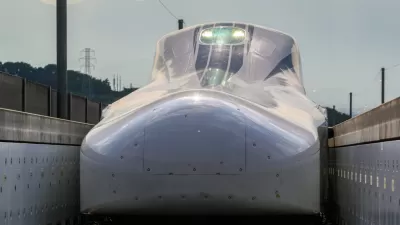A bank controlled by the government of Japan has promised $5 billion in financing for a proposal that would connect Washington D.C. and Baltimore via maglev, high-speed rail.

"An investor group hoping to build a high-speed train capable of cutting the travel time between Baltimore and Washington to 15 minutes says in a filing to state regulators that it has lined up more than $5 billion in financial backing," reports Kevin Rector.
The public Japan Bank for International Cooperation is behind the $5 billion, but the private Central Japan Railway Co. "has agreed to waive any licensing fees for use of its maglev technology," adds Rector.
"The details were included in Rapid Rail's filing Wednesday asking Maryland regulators for the old state franchise rights of the former Washington Baltimore & Annapolis Electric Railroad, a once-busy interurban electric rail car system that linked the three cities in the early 20th century."
The details of the so-called Northeast Maglev plans have been hinted at, but the filing released the first details about the Japanese government's involvement in the route. Previous reports on the Northeast Maglev also mentioned that the connection would continue on to New York City.
FULL STORY: Backers of high-speed 'maglev' train to Washington claim $5 billion in funding

Maui's Vacation Rental Debate Turns Ugly
Verbal attacks, misinformation campaigns and fistfights plague a high-stakes debate to convert thousands of vacation rentals into long-term housing.

Planetizen Federal Action Tracker
A weekly monitor of how Trump’s orders and actions are impacting planners and planning in America.

In Urban Planning, AI Prompting Could be the New Design Thinking
Creativity has long been key to great urban design. What if we see AI as our new creative partner?

King County Supportive Housing Program Offers Hope for Unhoused Residents
The county is taking a ‘Housing First’ approach that prioritizes getting people into housing, then offering wraparound supportive services.

Researchers Use AI to Get Clearer Picture of US Housing
Analysts are using artificial intelligence to supercharge their research by allowing them to comb through data faster. Though these AI tools can be error prone, they save time and housing researchers are optimistic about the future.

Making Shared Micromobility More Inclusive
Cities and shared mobility system operators can do more to include people with disabilities in planning and operations, per a new report.
Urban Design for Planners 1: Software Tools
This six-course series explores essential urban design concepts using open source software and equips planners with the tools they need to participate fully in the urban design process.
Planning for Universal Design
Learn the tools for implementing Universal Design in planning regulations.
planning NEXT
Appalachian Highlands Housing Partners
Mpact (founded as Rail~Volution)
City of Camden Redevelopment Agency
City of Astoria
City of Portland
City of Laramie





























